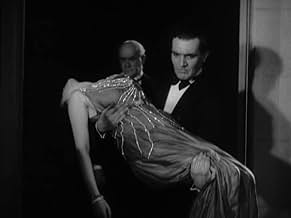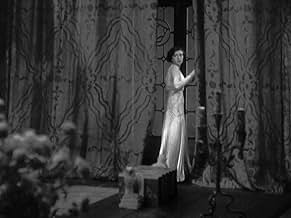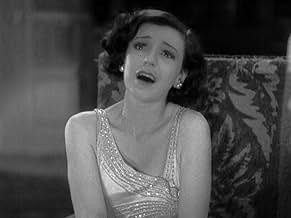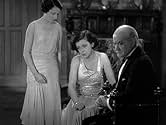PUNTUACIÓN EN IMDb
5,7/10
3,8 mil
TU PUNTUACIÓN
Una vieja familia tradicional y una familia moderna luchan por tierras en un pequeño pueblo inglés y casi se destruyen mutuamente.Una vieja familia tradicional y una familia moderna luchan por tierras en un pequeño pueblo inglés y casi se destruyen mutuamente.Una vieja familia tradicional y una familia moderna luchan por tierras en un pequeño pueblo inglés y casi se destruyen mutuamente.
- Dirección
- Guión
- Reparto principal
Rodney Ackland
- Man at Auction
- (sin acreditar)
Ivor Barnard
- Man at Auction
- (sin acreditar)
Wally Patch
- Van Driver
- (sin acreditar)
Reseñas destacadas
Technical crudities, print/sound deficiencies and dated acting styles taken into consideration, "Skin Game" still has innovative (for the time) camera techniques and thematic ambiguity (who is right and who is wrong? Who are the true villains of the story?) and is generally better than other, more "typical" Hitchcock films of the period, like "Murder!" from 1930.Edmund Gwenn is terrific and Phyllis Constam is quite sexy. (**1/2)
"The Skin Game" is one of Alfred Hitchcock's earlier sound pictures, and although the story held potential, it is a rather bland film despite a couple of good Hitchcock touches.
The story centers on a rivalry between two neighboring families who have very different views on the future of their community. Mr. Hornblower (Edmund Gwenn) wants to see the land developed and used for factories and businesses, while the Hillcrest family wants to see the traditional homes and countryside preserved. The resulting conflicts hold some real potential, and lead to some good moments as the families try to outwit each other in a "skin game", but the movie as a whole is never really very compelling.
It's hard to pinpoint exactly why this is not a better film. There are no big names in the cast, but Hitchcock made several fine movies with just this sort of cast. Gwenn is good in his role, and Phyllis Konstam is believable and sympathetic as his daughter-in-law whose troubled past eventually provokes a crisis between the two families.
Perhaps Hitchcock stayed too close to the play on which the film is based (it does have a bit of a stage-bound feel), or perhaps for once he did not have a strong sense of the material's potential.
Hitchcock saved his best for the movie's most important scene, when a crucial parcel of land is auctioned off. The auction scene, and a confrontation afterwards between the main characters, is well-done with some good twists.
There are also some nice ironic touches at the end.
Hitchcock fans should still watch "The Skin Game" at least once, to notice the ways that the director's usual touch can be seen, but this movie may not be of much interest to others.
The story centers on a rivalry between two neighboring families who have very different views on the future of their community. Mr. Hornblower (Edmund Gwenn) wants to see the land developed and used for factories and businesses, while the Hillcrest family wants to see the traditional homes and countryside preserved. The resulting conflicts hold some real potential, and lead to some good moments as the families try to outwit each other in a "skin game", but the movie as a whole is never really very compelling.
It's hard to pinpoint exactly why this is not a better film. There are no big names in the cast, but Hitchcock made several fine movies with just this sort of cast. Gwenn is good in his role, and Phyllis Konstam is believable and sympathetic as his daughter-in-law whose troubled past eventually provokes a crisis between the two families.
Perhaps Hitchcock stayed too close to the play on which the film is based (it does have a bit of a stage-bound feel), or perhaps for once he did not have a strong sense of the material's potential.
Hitchcock saved his best for the movie's most important scene, when a crucial parcel of land is auctioned off. The auction scene, and a confrontation afterwards between the main characters, is well-done with some good twists.
There are also some nice ironic touches at the end.
Hitchcock fans should still watch "The Skin Game" at least once, to notice the ways that the director's usual touch can be seen, but this movie may not be of much interest to others.
"The Skin Game" is not exactly classic Hitchcock-- no one could dispute that. But I still think it does not entirely deserve its bad ratings. There are a few--not too many, but a few-- interesting scenes and surprises. The characters are fairly sympathetic and well-drawn.
I think the fault of "The Skin Game" lies not in the fact that it is a stage-bound play-- Hitchcock worked wonders on screen with stage-bound plays, notably "Rope" and "Dial M for Murder". Perhaps it is that the emotions of the characters are not focused upon-- the camera keeps rather too distant. If the tone were more personal in this film, the performers might have a better chance to hold our interest.
If you are looking for entertainment and stimulation that one can normally find in a Hitchcock-- better to look somewhere else.
I think the fault of "The Skin Game" lies not in the fact that it is a stage-bound play-- Hitchcock worked wonders on screen with stage-bound plays, notably "Rope" and "Dial M for Murder". Perhaps it is that the emotions of the characters are not focused upon-- the camera keeps rather too distant. If the tone were more personal in this film, the performers might have a better chance to hold our interest.
If you are looking for entertainment and stimulation that one can normally find in a Hitchcock-- better to look somewhere else.
... but it is an adequate way to explain the dynamic for Americans.
Alfred Hitchcock directs this adaptation of John Galsworthy's play. The moneyed, cultured Hillcrists battle against the nouveau riche Hornblowers, the latter headed by the ambitious, combative patriarch (Edmund Gwenn). Their squabbles over the use of farm land for industrial purposes ends up causing heartache and tragedy for both families. Featuring C. V. France, Helen Haye, and Jill Esmond as the Hillcrists, and John Longden, Phyllis Konstam, and Frank Lawton as the other Hornblowers. With Herbert Ross, Dora Gregory, and Edward Chapman.
This had already been filmed (also with Gwenn) in 1921. The class-conscious storyline resonated well with the British, I suppose. Gwenn plays his role big, and is a stark contrast to his later, best-known Kris Kringle role in Miracle on 34th Street. Jill Esmond, the first wife of Laurence Olivier and originally the bigger star in the marriage, has one of her better film roles. As for Hitchcock's direction, the only stand-out scene is a lengthy auction with a lot of rapid-cut edits.
Alfred Hitchcock directs this adaptation of John Galsworthy's play. The moneyed, cultured Hillcrists battle against the nouveau riche Hornblowers, the latter headed by the ambitious, combative patriarch (Edmund Gwenn). Their squabbles over the use of farm land for industrial purposes ends up causing heartache and tragedy for both families. Featuring C. V. France, Helen Haye, and Jill Esmond as the Hillcrists, and John Longden, Phyllis Konstam, and Frank Lawton as the other Hornblowers. With Herbert Ross, Dora Gregory, and Edward Chapman.
This had already been filmed (also with Gwenn) in 1921. The class-conscious storyline resonated well with the British, I suppose. Gwenn plays his role big, and is a stark contrast to his later, best-known Kris Kringle role in Miracle on 34th Street. Jill Esmond, the first wife of Laurence Olivier and originally the bigger star in the marriage, has one of her better film roles. As for Hitchcock's direction, the only stand-out scene is a lengthy auction with a lot of rapid-cut edits.
I recently saw Hitchcock's "Rich and Strange" and really enjoyed it, so I was game for another go at this early 1930's British cinema, in my attempt to become a "Hitchcock completist." Please keep in mind that I'm an American with a pretty-good ear for British dialog, but there are some speeches contained here that I couldn't understand in the least. But only a fairly small portion that is. The early sound equipment doesn't help either.
The title "The Skin Game" refers to a heated altercation that leaves no holds barred, and no prisoners taken. The plot line is essentially a "Hatfields and McCoys" family feud over land rights, with a lot of dirt being dug up on both families involved. Like pretty much all early sound films, there is a heavy reliance on dialog and the spoken phrase, which makes "The Skin Game" obviously derived from the stage.
At the beginning there's a long take with probably ten pages of dialog in it, using a medium shot of three characters, with the camera panning between them. At least once, someone was speaking dialog while not on camera, which I always find distracting -- a minor flaw I admit, but noticeable. Hitchcock's pacing feels relatively quick considering, and he keeps interest in these scenes with dramatic exits and entrances of characters, and revelations of plot details.
Really some of these takes were so long that actors coughed, dropped things and retrieved them, and other apparent flubs that were never re-shot. Seems like once the director was five minutes into a scene he couldn't afford the film stock to begin again, so there are a lot of miscues and such, which kind of adds to the immediacy. Especially considering that I'm certain that even the young Hitchcock was keenly aware of every missed cue and dropped line, and it had to drive him to distraction! I was certainly impressed by this early Hitchcock effort and I'm sure that audiences back then went away from this one with the feeling that they got their money's worth. It was apparent that an extremely talented film maker was at work here, trying to keep the audience involved every step of the way. And he did succeed actually.
For instance, there is a scene at an auction house that lasts for about ten minutes, and Hitchcock sets it up in such a way to keep the audience anxiously awaiting the outcome. He has the camera making very fast pans from one bidder to the next, slowing down only when the bidding does. The audience has some background information about the proceedings, but not enough to spoil the surprise at the end.
It's early sound cinema -- so most viewers today can't bear this kind of thing, but if you're familiar with and enjoy films of the early 20Th Century, it's extremely enjoyable and does have a payoff at the end! *** out of *****
The title "The Skin Game" refers to a heated altercation that leaves no holds barred, and no prisoners taken. The plot line is essentially a "Hatfields and McCoys" family feud over land rights, with a lot of dirt being dug up on both families involved. Like pretty much all early sound films, there is a heavy reliance on dialog and the spoken phrase, which makes "The Skin Game" obviously derived from the stage.
At the beginning there's a long take with probably ten pages of dialog in it, using a medium shot of three characters, with the camera panning between them. At least once, someone was speaking dialog while not on camera, which I always find distracting -- a minor flaw I admit, but noticeable. Hitchcock's pacing feels relatively quick considering, and he keeps interest in these scenes with dramatic exits and entrances of characters, and revelations of plot details.
Really some of these takes were so long that actors coughed, dropped things and retrieved them, and other apparent flubs that were never re-shot. Seems like once the director was five minutes into a scene he couldn't afford the film stock to begin again, so there are a lot of miscues and such, which kind of adds to the immediacy. Especially considering that I'm certain that even the young Hitchcock was keenly aware of every missed cue and dropped line, and it had to drive him to distraction! I was certainly impressed by this early Hitchcock effort and I'm sure that audiences back then went away from this one with the feeling that they got their money's worth. It was apparent that an extremely talented film maker was at work here, trying to keep the audience involved every step of the way. And he did succeed actually.
For instance, there is a scene at an auction house that lasts for about ten minutes, and Hitchcock sets it up in such a way to keep the audience anxiously awaiting the outcome. He has the camera making very fast pans from one bidder to the next, slowing down only when the bidding does. The audience has some background information about the proceedings, but not enough to spoil the surprise at the end.
It's early sound cinema -- so most viewers today can't bear this kind of thing, but if you're familiar with and enjoy films of the early 20Th Century, it's extremely enjoyable and does have a payoff at the end! *** out of *****
¿Sabías que...?
- CuriosidadesThe title comes from a slang phrase for "an unscrupulous business operation". Although this movie is British, the term is considered American and dates back to just after the American Civil War (1861-1865). It is not to be confused with the similar-sounding aphorism "to have skin in the game", which refers to someone who has a stake, financial or emotional, in a business deal, wager, or other situation.
- Citas
[last lines]
Mr. Hillcrist: What is it that gets loose when you start a fight, and makes you what you think you're not? Begin as you may, it ends in this skin game! Skin game! When we began this fight, we'd clean hands. Are they clean now? What's gentility worth if it can't stand fire?
- ConexionesFeatured in Paul Merton Looks at Alfred Hitchcock (2009)
- Banda sonoraHabanera
(1875) (uncredited)
from "Carmen"
Music by Georges Bizet
Libretto by Henri Meilhac and Ludovic Halévy
Excerpt whistled by Jill Esmond
Selecciones populares
Inicia sesión para calificar y añadir a tu lista para recibir recomendaciones personalizadas
Detalles
- Fecha de lanzamiento
- País de origen
- Idioma
- Títulos en diferentes países
- The Skin Game
- Localizaciones del rodaje
- Elstree Studios, Borehamwood, Hertfordshire, Inglaterra, Reino Unido(Studio, destroyed during World War II and later rebuilt)
- Empresa productora
- Ver más compañías en los créditos en IMDbPro
- Duración1 hora 25 minutos
- Color
Contribuir a esta página
Sugerir un cambio o añadir el contenido que falta

































